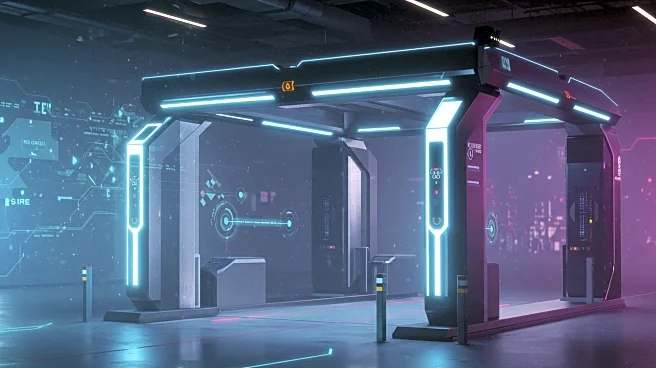What's Happening?
Outpost has introduced a new gate automation platform designed to improve operational efficiency for shippers, fleets, and terminal operators across the United States. The platform, which has been tested across more than 1 million gate events, allows drivers to enter and exit truck terminals without stopping, while ensuring that terminal operators capture essential data for operations and security compliance. The system includes AI voice agents that facilitate communication with drivers, streamlining the entry process. Outpost's CTO, Greg Akselrod, emphasized the importance of optimizing the AI voice agent to sound natural, which encourages clearer communication from truck drivers. This platform is touted as the industry's only vertically integrated gate automation solution, encompassing software, hardware, civil planning, installation, and ongoing remote operations services. Deployments can be completed in as little as one week.
Why It's Important?
The introduction of Outpost's gate automation platform represents a significant advancement in logistics technology, potentially transforming the efficiency of shipping operations in the U.S. By reducing the need for manual entry and exit processes, the platform can lower operational costs and improve turnaround times for fleets and terminal operators. This innovation is particularly relevant as the logistics industry seeks to enhance productivity and reduce bottlenecks in supply chains. The use of AI voice agents also highlights the growing role of artificial intelligence in streamlining communication and operational processes, which could lead to broader adoption of AI technologies in logistics and transportation sectors.
What's Next?
Outpost plans to continue expanding its network and deploying the gate automation platform across more terminals nationwide. As the technology gains traction, other logistics companies may consider adopting similar solutions to remain competitive. The success of this platform could prompt further innovations in AI-driven logistics solutions, potentially leading to new standards in terminal operations. Stakeholders in the logistics industry, including shippers and terminal operators, will likely monitor the platform's performance and impact on operational efficiency closely.
Beyond the Headlines
The deployment of AI-powered automation in logistics raises questions about the future of employment in the sector, as automation may reduce the need for certain manual tasks. Additionally, the integration of AI voice agents could lead to discussions about data privacy and security, given the need to capture and process communication data. As technology continues to evolve, ethical considerations regarding AI's role in logistics and its impact on human workers will become increasingly important.









